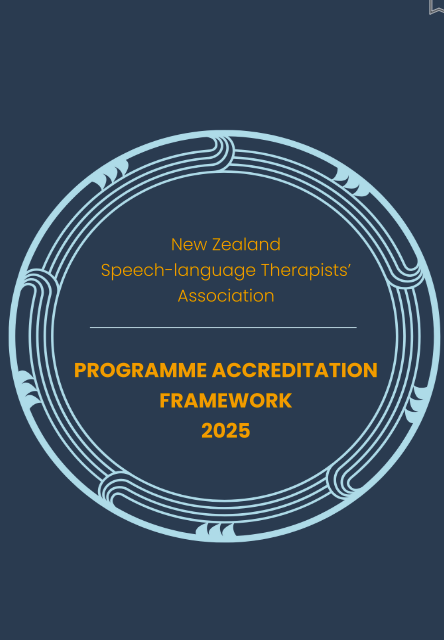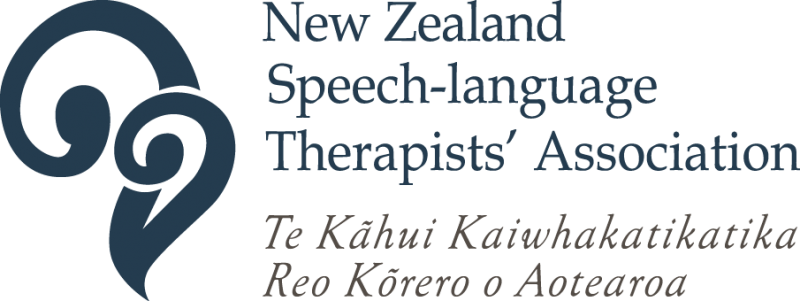The New Zealand Speech-language Therapists’ Association (NZSTA) is responsible for self-regulation of the speech-language therapy profession in Aotearoa. Accreditation is a core component of maintaining high standards of professional and clinical practice in speech-language therapy. The NZSTA, via the Programme Accreditation Committee (PAC), aims to support speech-language therapy Programmes to graduate speech-language therapists who are ready to practise in Aotearoa, with a strong sense of who they are as people and as speech-language therapists, with the humility to build relationships and connections with the diverse populations that we serve, and with the skills and knowledge to provide clinically and culturally safe speech-language therapy services, as defined by the NZSTA Scope of Practice
Accreditation, at its core, is the way in which the Association communicates to speech-language therapy Programmes that which is core to our identity as speech-language therapists in this place and of this time. It is a critical means of keeping the profession in relationship with the Programmes training the future generations of speech-language therapists in Aotearoa. If fully enacted, the Framework will mean that Programme staff, students, and colleagues in the profession are well supported as they educate and support new speech-language therapists.
The Association grants accreditation to speech-language therapy programmes that meet the NZSTA accreditation requirements. All New Zealand Universities offering speech-language therapy degrees with professional entry programmes, whether undergraduate or postgraduate-entry, are evaluated against the same requirements, embedded within Ngā Kete, within the Programme Accreditation Framework (PAF).

NZSTA Programme Accreditation Framework - download
To purchase hard copies - contact the secretariat.
The Programme Accreditation Framework
This Framework was born from a place in Te Kore, a place of unlimited potential, through the transition in Te Pō and emerging into the light of Te Ao Mārama. It is based on what is needed to unite the profession in its current landscape and guide speech-language therapy practice in Aotearoa New Zealand (hereafter referred to as Aotearoa) for the foreseeable future. A good Accreditation Framework serves to define, and support Programmes to uphold, a set of standards that will ready their students to be the rangatira (leaders) of tomorrow within the profession. To this end, the requirements specified within this Framework aim to respond to where speech-language therapy is now as a profession and within the current practice context of Aotearoa, but also to push us forward as a profession, to challenge us, and to grow graduates who will in turn lead the profession towards a future that looks different from current practice. While Programmes do not hold this responsibility alone, they have a crucial role in equipping our future workforce.
We recognise that the profession of speech-language therapy encompasses all of us - our students, their educators, those providing speech-language therapy services, and those working in research and academic spaces. The relationship between the speech-language therapy Programmes and the speech-language therapy workforce is not linear. Students do not flow in from the outside world and move in one direction towards becoming a member of our profession. The relationship has a cyclical nature, in which the workforce relies on our students and our students rely on the workforce.
This Framework reflects where our profession is, at the time of writing, on the journey towards decolonising and indigenising speech-language therapy practice. It is aspirational, looking to where we want to be, but also acknowledging that we cannot yet envisage where we need to be. As we move toward the aspiration of a bicultural profession, there is work for both Māori and tauiwi (non-Māori) to own. The nature of this work will differ, as a Tiriti partnership requires different roles of tangata whenua and tangata tiriti. Throughout the framework revision process, the review rōpū have strived to model a Tiriti partnership, in the make-up of the rōpū itself, and in the activities that contributed to how this framework came to be. It is grounded in mātāpono (values),and weaves the Māori version of Te Tiriti o Waitangi throughout. To the best of our ability, this is a bicultural document that has been created in a bicultural way, while holding the knowledge that this document must live in Institutions that are not bicultural.
The NZSTA Programme Accreditation Framework serves to:
- support Programmes to uphold their obligations under Te Tiriti o Waitangi;
- ensure Programmes are preparing and equipping students to work in a culturally safe way, in particular with tangata whenua;
- inform prospective and current students of standards for entry to the profession and the range of competencies they must achieve prior to recognition as members of the profession;
- demonstrate internationally the level of competency achieved by speech-language therapy graduates in Aotearoa, which supports graduate mobility;
- provide a benchmark against which speech-language therapy qualifications from other countries can be assessed for eligibility for NZSTA membership;
- inform Provider Institutions and Programmes of the minimum requirements of the professional education of speech-language therapists;
- advise the speech-language therapy sector of its responsibilities in supporting the education of speech-language therapists;
- outline the range and standards of practice employers can expect of graduating speech-language therapists at entry-to-practice; and
- promote dialogue between the Programmes and the NZSTA.
Provider Institutions are accredited against three key requirements of Ngā Kete, the standards of the framework:
Tuakiritanga (Identity)
Te Haerenga (The journey)
Pūkenga (Competences)
Accreditation Fee Structure
Accreditation fees are charged per university each year. Additional fees apply for new programmes seeking accreditation for the first time and accreditation site visits for universities with more than one accredited programme.
Programme Accreditation Committee
The Programme Accreditation Committee (PAC) oversees programme accreditation and monitoring of quality within the accredited Programmes and reports to the Board through the PAC co-chairs and NZSTA Executive Director.
PAC membership includes a Māori academic, the Professional Development portfolio lead from the NZSTA Board and members from each Programme and sectors in the profession.
Our current committee is:
Associate Professor Felicity Bright and Professor Suzanne Purdy (co-chairs), Marie Jardine (Māori academic), Aoife O'Reilly (Health), Fiona Cook (Education), MaryBeth Williams (Private Practice), Associate Professor Mershen Pillay (Massey University), Associate Professor Clare McCann (University of Auckland), Gina Tillard (University of Canterbury), and Jane McKinnon (NZSTA Professional Standards).
